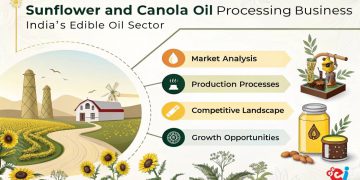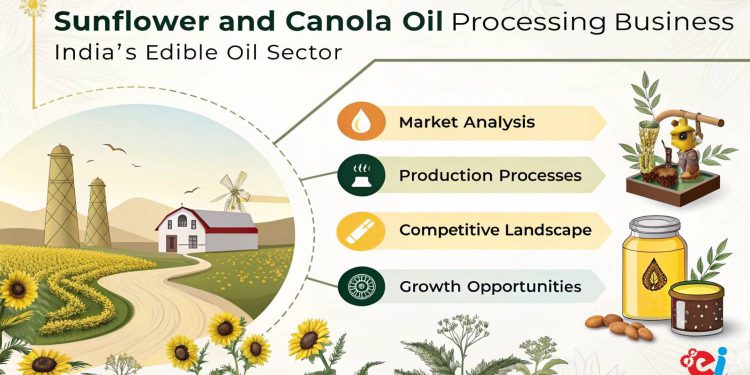Over-reliance Sunflower and Canola Oil Processing Plant
As one of the largest edible oil consumers, India has a high dependency on imports to satisfy domestic demand, which requires sunflower and canola oils as imports. The current dependence on sunflower and canola oil imports show an urgent need for local production and processing capabilities. Due to evolving health considerations, changing consumer preferences, and the Indian government’s promotion of self-reliance atmanirbhar-bharat, there is an appropriate window of opportunity for entrepreneurs to venture into the sunflower and canola oil industries.
Sunflower and canola oil have global recognition for their health benefits and culinary versatility, especially in Indian cuisine. They are ideal for both household and commercial use due to their high unsaturated fat content, low trans fat levels, and good oxidative stability. Investors looking to launch a sunflower and canola oil processing business in India stand to gain tremendous value as it will not only contribute towards national food security and agricultural value-addition but also support domestic economic stability.
This article is aimed at budding entrepreneurs and provides important insights on the overview of the industry, raw material sourcing, the oil extraction and refining processes, plant setup, market entry strategies, and financial outlooks.
Comprehending The Demand for Oil in India (Sunflower & Canola)
There is a consistent growth in the per capita consumption of edible oils in India because of the increasing population, urbanization, and dietary changes. While regional oils like mustard, groundnut, and coconut are still in vogue, sunflower and canola oils are gaining considerable traction in the urban and health-conscious segments. This is due to their light texture, delicately flavored taste, and high nutritional value of omega-3 and omega-6 fatty acids.
Particularly, sunflower oil is now a staple in Indian households because of its heart-friendly image and extensive use in frying, baking, and sautéing. Canola oil is gaining rapid acceptance in India because of its low saturated fat content and advantages in managing cholesterol. Both oils find applications with fast food outlets, snack foods, ready to eat foods, and health focused cooking.
Regardless of this need, India imports more than 70% of its sunflower oil and most of its canola oil is imported from Ukraine, Russia, Canada and Australia. The crude geopolitical tensions in the areas have disrupted supply chains, escalated the cost of oil, and further exposed the weaknesses in India’s oil ecosystem. This situation highlights the opportunities that exist for these processing units to mitigate dependency, stabilize prices, and maintain food security.
Related Research Reports
Sourcing of the Raw Material and Relation to Agriculture
In the case of an active venture on oil production, availability of consistent and reliable sources of quality oilseeds is critical. The major missing components are the oilseed sunflower and canola. In India, sunflowers are cultivated in several regions like Karnataka, Maharashtra, and even Andhra Pradesh, along West Bengal. On the other hand, canola (or rapeseed) has a low production yield, meaning contract farming, partnered seed development, or even a direct purchase would be needed at the start.
By partnering with Farmer Producer Organizations (FPOs) and using high-yield seeds with backward integration models, entrepreneurs have an untapped opportunity in seed procurement. With suitable agri-climatic conditions in specific regions, and crop diversion awareness campaigns in place, canola farming can easily be advocated in the central and northwestern states under buyback agreements. With the right policy support, India can expand its footprint for oil crop cultivation.
Moreover, the leftover seed processing by-products—sunflower and canola meal—serve as important materials in the livestock and poultry industries, offering additional profit alongside waste reduction.
Steps for Extracting Oil
The production of plant-based oils is divided into two processes: extracting crude oil and refining it. The seeds need to be cleaned and dehulled before any extraction process. Depending on the scale of oil production, the oil content is either removed mechanically (expeller process) or through solvent extraction. After the oil is extracted, it goes through filtering and refining processes such as degumming, neutralization, bleaching, and deodorization.
For the health and organic product segments, cold-pressed variants help them retain more nutrients, even for sunflower and canola oil. Although the yield is lower than the conventional methods, these are more appealing to consumers.
And while the oil retains beneficial tocopherols and phytosterols, the light color and neutral flavor along with lacking of any impurities determines the quality. Product quality, energy consumption, and environment safety are some of the pillars modern plants focus on during continuous refining that use automation technology.
In bulk for commercial clients or retail-friendly pouches, bottles, and jars, proper sealing and nitrogen flushing are mandatory to provide hygiene and shelf stability, no matter the form.
Setting Up a Vegetable Oil (Sunflower & Canola Oil) Processing Plant
In order to have a unit for processing sunflower and canola oil, capital investment, careful choice of location, along with having a good logistical operational understanding are all required. Transportation cost is one factor taken into account with the location having to be closer to the oilseed producing regions. Along with water, and electricity, the location needs to be accessible skilled road connected manpower.
A modern processing plant of medium capacity employing the use of oilseed processing plants per day requires approximately 30,000 to 50,000 sq. ft. of built up area. An oilseed processing plants has main components such as seed cleaning systems, crushers, expeller, solvent extraction units, refining vessels, storage tanks, and packaging machinery. Other economically important utilities comprise steam boiler units chilling devices, water filtering devices, and ETP’s( Effluent Treatment Plants).
They estimate that the project will require a capital investment ranging anywhere between ₹10 crore to ₹25 crore with funding varying baseders of advanced automation levels, product range variety, or size of the business. It is also necessary to allocate working capital for purchasing oilseeds, paying wages, managing operational costs, and covering transportation expenses.
Most of the NPC is extremely valuable to entrepreneurs interested in other services and specialized feasibility studies. NPCS provides elaborate detail for project reports, machinery vendor guides, detailed blueprints, and various other financial models that aid in better decision making. From NPCS, one can expect greater assistance with documenting project financing, applying for MSME subsidies, and drafting plans for compliance of legal regulations.
Legislative Allowances and Quality Verification
Stringent regulations govern the safety and qualitative aspects of the edible oil industry. Prior certifications of policy requirements need to be met by oilseed extraction companies and FSSAI, which involves consistent domain physical condition audits compliances to domain objection detection, extraction and rendering rules for diagram labeling and wrapper cleansing.
With regard to quality assurance and the possibility of exports, BIS certification is crucial. Moreover, HACCP certification and GMP standards, along with ISO 22000(food safety management), expand consumer trust and unlock B2B and retail collaborations.
Factory registration, pollution control certificates, fire safety approvals alongside clearances from local municipal bodies are required as well. APEDA registration is essential for exporters while complying with the destination country’s requirements such as Codex Alimentarius, FDA for the US, or EU food laws.
NPCS assists entrepreneurs by compiling regulatory checklists, application papers, and audit templates. Such pre-prepared compliant frameworks ease the burden of compliance and help entrepreneurs enable a smooth business setup.
Related: How to Start a Manufacturing Business of Edible Oils Processing, value added Products Manufacturing
Branding and Market Entry Strategy
For a vegetarian oil brand, filling in the gaps ensures dependence by the customers to trust the brand thus makes consumer reliance and market share highly advantageous. As for most Indians, honesty, value for money, sourcing openness and health acts as central pillars for marketing whilst cholesterol levels, omega 3 content, lightness, and Indian culinary uses form the forte of the brand marketing strategies.
In retail, the brand needs to be showcased in eye-catching packaging. Also, nutritional values ought to be showcased boldly. To reach out to food manufacturers, restaurants and households, the brand should have a wider target audience by offering multiple SKUs of 500ml, 1 liter, 5 liter jars and commercial 15 liter tins.
The focus is on targeting FMCG suppliers, modern trade, kirana stores, and grocery shops for distribution. Health-centered brands also seem to prefer selling through websites, eCommerce, and direct-to-consumer channels (D2C) focuses online.
Consistent bulk demand alongside increased margins comes from institution sales to bakeries, hotels, caterers, and packaged food brands. Countries with a high population of Indians and Asians like UAE, UK, US, and Singapore are good prospects for export sunflower and canola oil made in India.
Financial Projections and Return on Investment (ROI)
A well-executed sunflower and canola oil processing unit can become profitable within two to three years. The gross margins typically range between 15–25% depending on seed procurement prices, process efficiency, and value-added packaging. Oilseed prices are volatile, but maintaining diversified sourcing and strong inventory management can mitigate risks.
Revenue streams include refined edible oil, by-products like oilseed cakes for animal feed, and bran or wax used in cosmetics or pharmaceuticals. Value-added offerings such as cold-pressed, organic-certified, or vitamin-enriched variants command premium pricing and better profitability.
According to feasibility assessments from NPCS, a 100 TPD plant running at 70–80% utilization can generate annual revenues of ₹50–₹100 crore with EBITDA margins of 12–15%. With growing consumer demand and import substitution support from government policies, ROI can be accelerated through efficient operations and strong distribution.
Conclusion: A Golden Opportunity in India’s Edible Oil Ecosystem
The vegetable oil (sunflower and canola oil) processing business is more than just a food manufacturing opportunity—it’s a strategic contribution to India’s self-sufficiency in nutrition, rural employment, and agro-industrial growth. By bridging the gap between demand and domestic supply, entrepreneurs can tap into a market that promises long-term resilience and rewarding returns.
With clear demand drivers, accessible technology, viable financial models, and expert guidance from Niir Project Consultancy Services, setting up a sunflower and canola oil processing plant is a robust venture aligned with national priorities and global health trends.


















